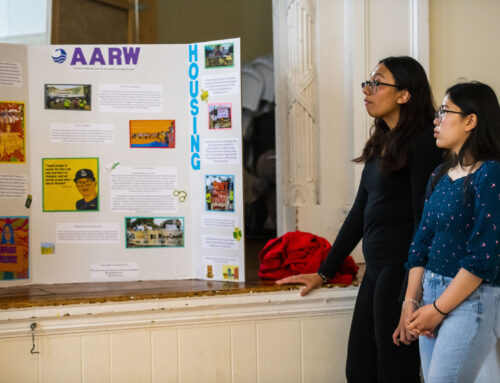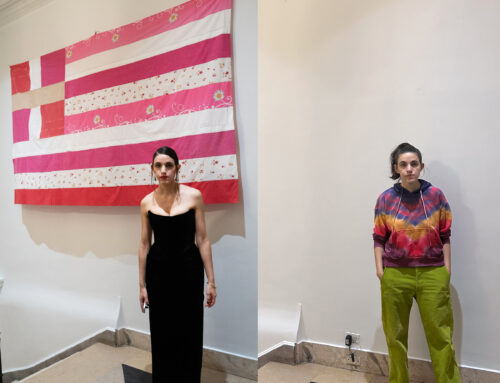From Print Issue 3: Community.


Art by Roshani Trivedi
The first, albeit partial, lie I remember telling my grandmother was two weeks ago. She was kneeling, next to the oversized mushrooms in her garden, picking each one carefully by its browning stem. I knew she would be outside. She couldn’t escape the warmth, it reminded her of India. I watched her from a distance as her arms moved mechanically to twist the cap of each mushroom off—brush soil over the bare, unplugged vacancy left in the dirt—and readjust her sun hat. She was always like that, fixing what she’d broken, smoothing out spontaneous wrinkles, uniting fragments of nature. Her motions, though repetitive, were calming.
My phone buzzed in my pocket, breaking my transfixed gaze on Dadi’s swift, monotonous movements. It was my mother; I could feel the panic wrapped in her text messages. All twenty messages were short bursts—letters uncapitalized and words casually misspelled. My mother is a doctor; she works fast and types quickly, hitting the “send” button in between lingering sentences and unfinished thoughts. I waited to see if she had anything else to say. I am used to her figuring it out, creating a sound, bulletproof plan for me. But, this time, the matter at hand was unexplored terrain for her, just as it was for me.
You’re the only one. At home. You should tell her. We shouldn’t. Wait anymore.
My mother’s words were written with clarity and her message was blunt. She wanted me to break the news to Dadi. Now. Yet, my thoughts were a hazy pulse, beating arrhythmically, unsure of what to do next.
Moving closer to Dadi, I kept my eyes focused on the rows of bulging button mushrooms that peaked from beneath the Earth. They resembled the trunks of palm trees, hunched over the soil as the wind whistled by. Sensing that someone was behind her, Dadi shifted her weight and tilted her sun hat to look at me.
I kept my eyes steadily fixed on the fungi as I told her. I started with a lie, but then quickly, unwittingly converted to the truth. The words came out more naturally than I thought; I didn’t stumble or pause to look at her face as I revealed the news. I noticed her spine bending over in defeat, much like the mushrooms, as I finished telling her. We both stood in the midst of the garden, like intruders in a dream, not speaking or looking at each other. Due to COVID-19, United Airlines canceled her flight from Newark to India and she would have to wait until conditions were safer to travel.
Dadi made it an annual ritual to visit her refuge—her home in India. It would only be for one month at a time, but the trip would be one which she anticipated and packed for all year long. She lived in a buoyant state in India, floating from day to day without having to face a store clerk who smirked at her accent, without having to dismantle shame. Her home in India was her hybrid space, where she mixed into social spheres with ease and felt comfortable in her bearing. She wouldn’t be going this year.
We rebooked her flight for September, four months later than she had expected. Dadi lives with us in New Jersey. In fact, she has been living with us for over seventeen years. Though Dadi wasn’t merely a visiting guest, she had yet to make our house her own. It still seemed like her stay was one, extended, seventeen-year-long visit and she was always preparing to return to her home in India.
That evening, after my grandma had heard the news, the sky was caught between sundown and nighttime, creating a palette of warm rose and amber hues for my parents and me to stare at as we ate in silence. Dadi had prepared a tender lemon-garlic mushroom flatbread. I remember smirking earlier when she had told me what she would be cooking for dinner. I was always awestruck by her kitchen experiments—it could be Italian calzones, Thai noodles, or Mexican corn on the cob, but never Indian food. Most grandmothers cook to rekindle a connection with their roots, to share an inherent part of themselves with family. It didn’t feel natural for Dadi to cook any and everything but Indian food. When I asked her about this, she said that immersing herself in another language, culture, or cuisine felt liberating. She liked reserving her Indian identity, her traditional sarees, Indian food, and raw spices for India, never letting her Indian identity bleed into America.
I’ve realized that everyone has a blissful refuge they like to keep to themselves. Though they may migrate or spread, their refuge is always lodged like a silent chime in the back of their minds, only playing its tune when called upon; they’re inherently tied to what they call home. Dadi’s blissful paradise is the cement roof of her home in India, where summer air has cherry undertones, where she makes light conversation with passersby and studies the sun-dried chilies as they bask in daylight.
Later that night, I purchased an online book titled The Geeta (Gujarati & English), a devotional book Dadi reads, interprets, and wrestles with when praying in India. I took a separate notebook out and jotted down my thoughts on the first few pages of The Geeta which were thankfully written in both Gujarati and English. I’m not used to seeing the two languages in such close proximity, their voices mingling as if they were both singers in the same chorus. During this period, I felt like a divided person though my eyes immediately drift towards the English side. On the last page of my notebook, I write questions I want to discuss with Dadi. As I study the text further and delve into its hidden intricacies and underpinnings, the next linguistic step becomes clear.
I knocked three times on Dadi’s door. She’s probably not up at this hour, I reason. Yet, Dadi pulls the framed door open and welcomes me in with a smile. I bring my laptop up and show her the cover page of The Geeta. Dadi’s eyes widen at first, confused, and then soften. Then, I bring my notebook to her chest. I watch her calloused hands brush the questions I wrote on the page as she nods in approval.
“We’ll discuss in the morning, beta,” she responded quietly as she gripped my notebook tighter as if trying to hold on to it. I let her keep it until the next morning.
I still don’t quite understand my mysterious impulse that night or why I had felt the urge to begin reading an Indian religious text. I wanted to share something with Dadi, to bring India to her, to fill the vacancy she was experiencing since she wouldn’t be able to visit her home this year. It felt like an act of rebellion since Dadi doesn’t like bringing Indian rituals, foods, or texts into our foreign American home. Yet, her desire to help me understand The Geeta and walk me through the book’s pages revealed that her Indian culture and identity were always an omnipresent force, now simply being brought to light by the bilingual text in front of our eyes.
The next morning, Dadi took me into the garden after we reviewed The Geeta together. We stared out at the empty soil where the arched mushrooms resided just yesterday. I asked her if we could plant some sugar beets this time. After all, I reasoned, we had just discussed The Geeta’s lesson on the importance of change — how the fear of change is really a fear of loss, a loss of something familiar, but something that needs to be embraced. Dadi hesitantly eyed me before agreeing. It was a small act of change since Dadi was used to growing and tending mushrooms, but she pulled her sun hat on and immediately began clawing at the soil to form open pockets of air to hold the sugar beet seeds. I cupped my hands around hers as we piled the soil over the seeds. She accepted my help, accepted the change I had proposed, and accepted the uncertainty, but beauty of growing something new. Back in India, Dadi’s haven lied in constancy, falling into the comforts of what she knew, never seeking change. Although I couldn’t rebuild India, Dadi’s cement roof, or her country’s reddening sky, I offered her a second community—a home that pushed her to unpack her dual identities and embrace the melodies of dissonance.



